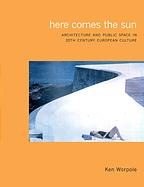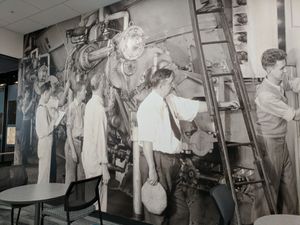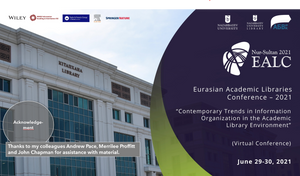 We have just spent a while on the San Juan Islands (off the North West coast of Washington State and East of Vancouver Island for unfamiliar readers – Wikipedia).
We have just spent a while on the San Juan Islands (off the North West coast of Washington State and East of Vancouver Island for unfamiliar readers – Wikipedia).
I bought a couple of books in the congenial Pyramidion Used and Rare Books in Eastsound on Orcas Island. I was surprised and pleased to find Here comes the sun: architecture and public space in Twentieth-Century European culture by Ken Worpole (whom I have mentioned before in these pages). This was something that I thought I might buy when it came out but I never got around to it. And there it was – its golden covers standing out on the shelf. Worpole writes about the role of places in our social lives, and has written interestingly about public libraries.
Serendipity is indeed important.
It seems to me that I hear evocations of the importance of serendipity in the stacks and racks more often as folks are trying to explain what is lost as we take the digital turn. My response is that yes, serendipity is important, and there is an obvious imperative here: we need to make our data work harder to support the much enhanced opportunities for serendipity our network services provide. One of the ironies of the current discussion of the future of cataloging is how un-stretched existing catalog data is in our systems, whatever about additional or different metadata.
Aside: One of the more interesting chapters in Here comes the sun, with some wonderful pictures, is about the lido, the open-air swimming pool. I mentioned the pictures of lidos in my earlier post. I was interested to see that the one LibraryThing collector of this volume had tagged it with ‘lidos’, maybe sharing my impression of the interestingness of this chapter within the whole (the other tag is ‘Britain’ although the work self-describes with ‘European’ and has a Northern European focus), or indicating its importance in the published record of the lido. Who knows? However, this allows it to be related – potentially serendipitously for some users – to Liquid assets: the lidos and open air swimming pools of Britain. Interestingly, this connection is not made by the subject headings on either book (Here comes the sun; Liquid assets). It may or may not be appropriate to have expected the application of subject headings alone to have made the link but I think it does point up the desire to develop better ways of relating resources in multiple ways, as shown, in, for example, the work of the Powerhouse Museum.
Related entries:
Share
More from LorcanDempsey.net



